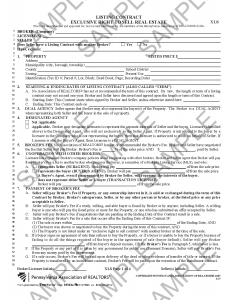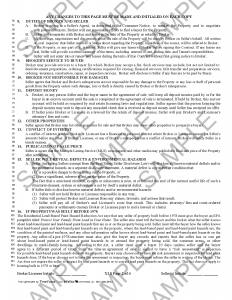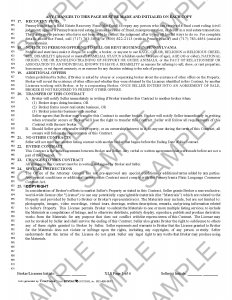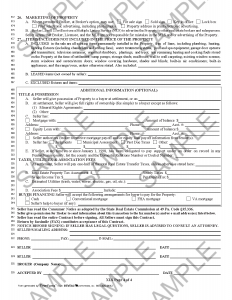Listing Your Home
So you chose your agent, good for you! Let’s see what kind of listing agreements you can enter before your agent starts taking action.
First and foremost, your agent should present you the Consumer Notice upon your first substantial contact. Then she will present you the listing agreement. This is an employment contract between you and the agent. It is a contract for the real estate professional services of your agent, not for the transfer of real estate. All states require that the listing agreement be in writing to be enforceable in court.
Please note that your agent’s authority to provide brokerage services originates within her broker. Even though your agent may perform most, if not all, of the listing services, the listing remains with the broker. In short, she represents the brokerage firm she is affiliated with.
Several types of listing agreements exist. The type of contract determines the specific rights and obligations of the parties.
In the exclusive right-to-sell listing, one broker is appointed as the sole (exclusive) agent of the seller. The broker is given the exclusive right, or authorization, to market your property. If the property is sold while the listing is in effect, you must compensate the broker regardless of who sells the property. In other words, whether you find a buyer with or without the broker’s assistance, you still must pay the broker a fee.
You will benefit from this form of agreement because the broker feels freer to spend time and money to actively market the property, making a timely and profitable sale more likely. From the broker’s perspective, an exclusive right-to-sell listing offers the greatest opportunity to receive compensation.
The broker cannot have authority to execute an agreement of sale for the owner or have an option to purchase the listed property. Nor can the broker have authority to confess judgment for the commission in the event of a sale.
In an exclusive agency listing, one broker is authorized to act as the exclusive agent of the principal. However, you retain the right to sell the property yourself without obligation to the broker. An exclusive agency listing must contain the same provisions as an exclusive right-to-sell listing except for the bold-faced type about the seller’s obligation regarding payment of compensation.
In an open listing (also known in some areas as a nonexclusive listing), you retain the right to contract with any number of brokers as agents. The brokers can act simultaneously, and you are obligated to compensate only the broker who successfully produces a ready, willing, and able buyer. If you personally sell the property without the aid of any of the brokers is not obligated to pay a commission.
The terms of an open listing must still be negotiated, however. These negotiated terms should be in writing to protect the broker’s ability to collect an agreed-on fee from the seller. The Regulations require any broker taking an oral open listing to give the seller a written memorandum stating all the terms of the listing agreement.
Information needed for listing agreements
Obtaining as many facts as possible about the property ensures that most contingencies can be anticipated. This is particularly important when the listing will be shared with other brokers through the MLS and when the other licensees must rely on the information taken by the listing agent.
The information needed for a listing agreement generally includes the
-
names and relationship, if any, of the owners;
-
size, type, age, and construction of improvements;
-
number of rooms and their sizes;
-
dimensions of the lot;
-
existing loans, including such information as the name and address of each lender, the type of loan, the loan number, the loan balance, the interest rate, the monthly payment which includes principal, interest, taxes, and insurance (PITI), whether the loan may be assumed by the buyer and under what circumstances, and whether the loan may be prepaid without penalty;
-
possibility of seller financing;
-
amount of any outstanding special assessments and whether they will be paid by the seller or assumed by the buyer;
-
zoning classification of the property;
-
current (or most recent year’s) property taxes;
-
neighborhood amenities (e.g., schools, parks and recreational areas, churches, and public transportation);
-
real property, if any, to be removed from the premises by the seller and any personal property to be included in the sale for the buyer (both the listing contract and the subsequent purchase contract should be explicit on these points);
-
any additional information that would make the property more appealing and marketable; and
-
required disclosures regarding property conditions. Check out this post to learn what you should disclose before your agent markets property.
Here is an example of an exclusive right-to-sell listing agreement:









